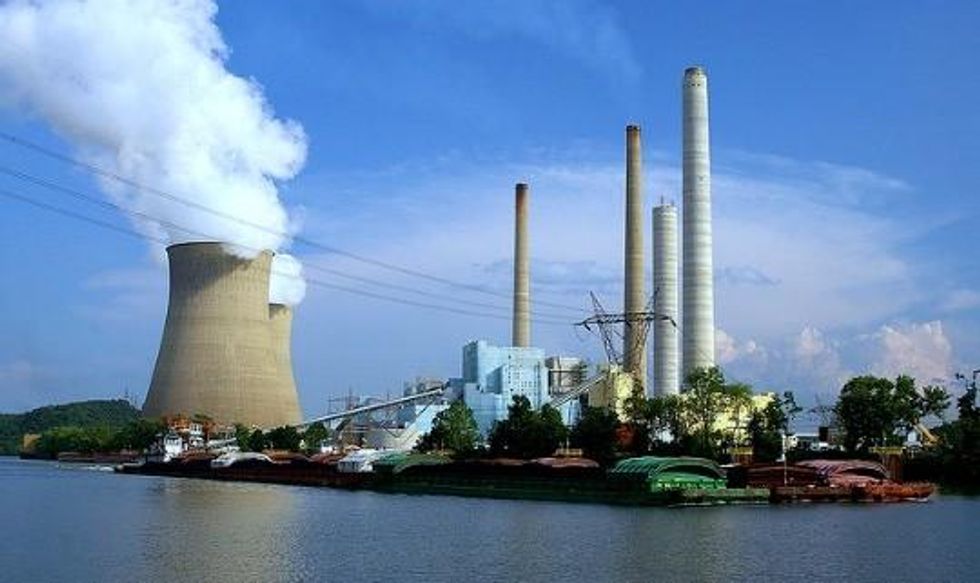The
Clean Water Act has been "almost universally ignored by power companies and permitting agencies," says a coalition of environmental groups who released a report Tuesday revealing a long list of toxic poisons that are routinely discharged into rivers, lakes and bays across the country.
The report, conducted by Waterkeeper Alliance, Sierra Club, Environmental Integrity Project, Earthjustice and Clean Water Action, studied 386 coal-fired power plants and their local permits and found that substances such as arsenic, boron, cadmium, lead, mercury and selenium are almost continually released into public waterways.
"We look out for lead paint when we buy a home and we clear our kids from the room when a mercury thermometer breaks on the ground--so why would we let the coal industry dump millions of pounds of these poisons into our water?" --Mary Anne Hitt, Sierra Club
According to the groups, "existing standards" that apply to coal plant wastewater were last established in 1982 and have not kept up pace with contemporary coal plant practices, which emit vast amounts of toxic substances in their coal ash and scrubber wastewater discharges that are eventually "dumped" into the environment.
"We look out for lead paint when we buy a home and we clear our kids from the room when a mercury thermometer breaks on the ground--so why would we let the coal industry dump millions of pounds of these poisons into our water?" said Mary Anne Hitt, Director of the Sierra Club's Beyond Coal campaign.
The report, Closing the Floodgates: How the Coal Industry Is Poisoning Our Water and How We Can Stop It, finds that:
- In the absence of any effective pollution limit, coal plants have become by far the largest source of toxic water pollution in the country
- Of the 274 coal plants that discharge coal ash and scrubber wastewater into waterways, nearly 70 percent (188) have no limits on the toxics most commonly found in these discharges (arsenic, boron, cadmium, lead, mercury and selenium) that are dumped directly into rivers, lakes, streams and bays.
- Of these 274 coal plants, more than one-third (102) have no requirements to monitor or report discharges of these toxic metals to government agencies or the public.
- A total of 71 coal plants surveyed discharge toxic water pollution into rivers, lakes, streams and bays that have already been declared impaired due to poor water quality. Of these plants that are dumping toxic metals into impaired waterways, more than three out of four coal plants (59) have no permit that limits the amount of toxic metals it can dump.
- Nearly half of the coal plants surveyed (187) are operating with an expired Clean Water Act permit. Fifty-three of these power plants are operating with permits that expired five or more years ago
The study finds an extreme lack of any "binding federal standards" that would limit toxic pollution from coal plants.
"The U.S. Environmental Protection Agency (EPA) has repeatedly acknowledged that existing guidelines have not kept pace with developments in the industry," the group writes. "However, for more than three decades the U.S. EPA has failed to set standards to curb the billions of pounds of pollution power plants dump into our rivers, streams and lakes each year from coal ash and scrubber sludge wastewaters. "
"Allowing coal polluters to fill our rivers and lakes with this witches brew of toxic chemicals threatens public health and diminishes quality of life for Americans," said Robert F. Kennedy, Jr., President of Waterkeeper Alliance. "The Clean Water Act is one of our nation's greatest achievements, but 40 years after this critical legislation was passed, the coal industry is still polluting with impunity, thanks to a loophole no other industry has enjoyed."
Citing recent causes of these weak regulations, Earthjustice's Climate & Energy Vice President Abigail Dillen, pointed to the White House's Office of Management and Budget and recent "closed door meetings" in which tough regulations proposed by the EPA were seriously watered down.
Dillen writes:
EPA sent over a strong rule to the [Office of Management and Budget] that proposed affordable treatment solutions for a serious water pollution problem. But after closed-door meetings with industry, OMB decided to overrule the experts at EPA and propose so-called 'preferred' options that will give coal plants a free pass to continue dumping toxics into our waterways. It's outrageous that OMB is caving to coal interests instead of getting arsenic and other poisons out of our drinking water.
_______________________




